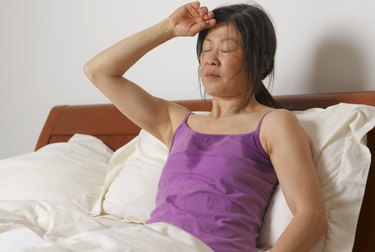
Smell something foul when sleeping? Body odor at night rarely tops the list of serious health woes, but it can be embarrassing and disconcerting. Sour body odor when sleeping usually isn't a cause for concern, but the sweating could be a sign of benign hyperhidrosis or a more serious ailment.
Simply put, your body smells because you sweat. Sweat is fluid secreted by the sweat glands (called eccrine and apocrine glands) onto the skin's surface, according to the Cleveland Clinic. When the sweat evaporates, you feel cooler as the body seeks to maintain its ideal temperature.
Video of the Day
Video of the Day
But sweat doesn't actually smell. That pungent odor comes from the bacteria breaking down acids in the sweat produced by the apocrine glands. And the bacteria's waste products are what accounts for the smell, per the Cleveland Clinic.
Excessive Sweating at Night
There are a couple of possible reasons for that sour nighttime body odor, explains Washington, D.C.-based board-certified Adam Friedman, MD, FAAD, professor and chair of dermatology at the George Washington University School of Medicine & Health Sciences.
It could be a condition called hyperhidrosis, or excessive sweating, defined as sweating when the body doesn't need to be cooled. There are two types of hyperhidrosis, Dr. Friedman says: primary and secondary.
With primary hyperhidrosis, a person sweats profusely "for no rhyme or reason," he says, and has done so since adolescence or earlier. It can be annoying or embarrassing, but it's usually benign and can be controlled by using antiperspirants or antibacterial wipes, especially in the underarm and groin areas.
Secondary hyperhidrosis usually begins in adulthood. "It appears out of nowhere and is a sign of an underlying medical issue," Dr. Friedman says.
The sweating may occur all over the body (generalized) or may target a single area (focal), and there are many possible causes, according to the U.S. National Library of Medicine (NLM), including:
- Overactive thyroid
- Tuberculosis or other infections
- Anxiety disorders
- Cancer
- Pheochromocytoma (adrenal gland tumor)
- Menopause
- Substance use
- Glucose control disorders (aka diabetes)
- Stroke
- Heart or lung disease
Certain medications, Dr. Friedman says, can also cause hyperhidrosis, including:
- Some antidepressants
- Hormonal medications
- Heart medications
Simple steps, according to the Cleveland Clinic, that can help you remedy body odor from primary hyperhidrosis include:
- Keeping your skin clean via daily bathing
- Regularly laundering clothing
- Limiting spicy foods and garlic in your diet
- Using antiperspirant
- Shaving the armpits, so that sweat evaporates more rapidly and doesn't have time to interact with bacteria
- Wearing natural fibers like wool and cotton that allow your skin to breathe
If the problem is more severe, treatments could include, per Cleveland Clinic:
- Botox injections in the armpits
- Prescription medications
- Surgery to remove sweat glands from under the arms or to prevent nerve signals from reaching the sweat glands
Dr. Friedman says another effective treatment for excessive sweating is topical glycopyrronium, a prescription cloth towelette.
When to See a Doctor
So, when is it time to call the doctor? The following signs, according to the Cleveland Clinic, are cause for concern:
- Regularly sweating while sleeping
- Skin is regularly damp with sweat
- Often sweating through your clothes
- Excessive sweating that interferes with holding things or opening door knobs
- Frequent skin infections in sweat-prone areas
- Bleach-like odor (which can be a sign of kidney disease)
- Fruity body odor (which may be a sign of uncontrolled diabetes)
- Sudden increase in sweat
In general, that night sweat may be nothing to sweat about. But if the problem lingers or you have any other concerning symptoms, it's worth a chat with your doctor to help sniff out if anything more serious is afoot.
Read more: This Is Why Your Deodorant Isn't Working Anymore
- U.S. National Library of Medicine: “Hyperhidrosis”
- Cleveland Clinic: “Sweating and Body Odor: Overview”
- Adam Friedman, MD, FAAD, board-certified dermatologist; professor and chair of dermatology; director, Residency Program; director, Translational Research; George Washington University School of Medicine & Health Sciences, Washington, DC
Is this an emergency? If you are experiencing serious medical symptoms, please see the National Library of Medicine’s list of signs you need emergency medical attention or call 911.